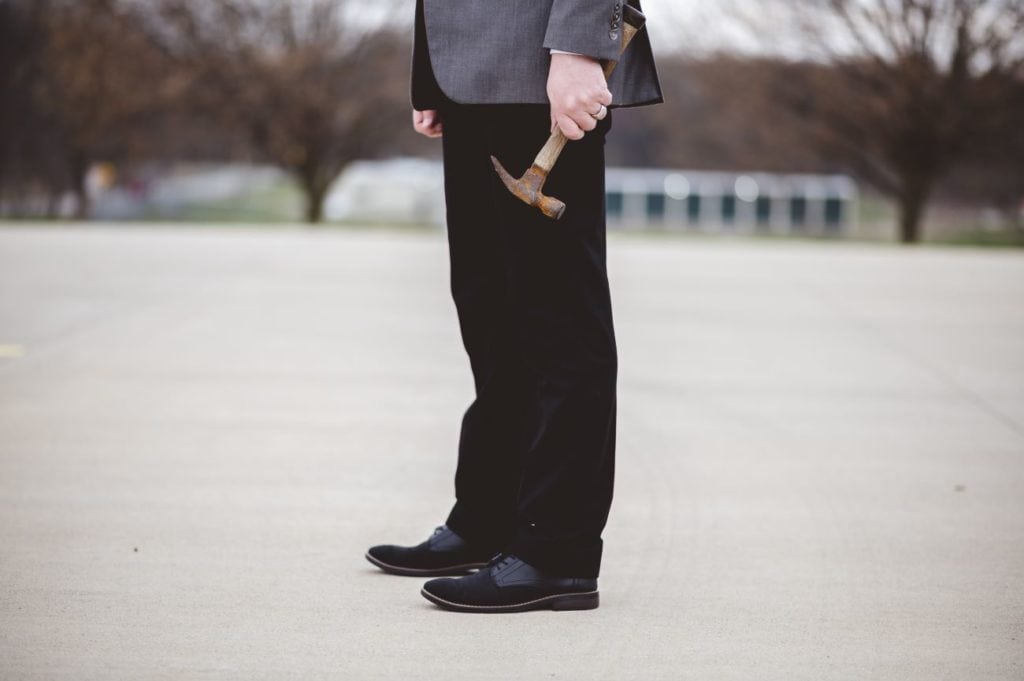
In Nevada, assault with a deadly weapon is a serious crime that can carry severe penalties, including imprisonment. But what constitutes a deadly weapon? Is kicking someone considered assault with a deadly weapon in Nevada? In this article, we will explore the legal definition of assault with a deadly weapon in Nevada and examine whether kicking someone falls under this category.
Defining Assault with a Deadly Weapon in Nevada
Nevada Revised Statutes (NRS) 200.471 defines assault with a deadly weapon as “An attempt to use physical force against another person with the intent to cause physical harm, accompanied by the use of a deadly weapon.”
A deadly weapon is defined as “Any instrument which, if used with the intent to cause death or bodily harm, could reasonably cause death or bodily harm.” (NRS 202.255)
Is Kicking Someone Considered Assault with a Deadly Weapon?
Kicking someone can be considered a form of physical force, but whether it constitutes assault with a deadly weapon depends on the circumstances. In Nevada, case law has established that feet can be considered deadly weapons in certain situations.
In the 1993 case of State v. Hearnes, the Nevada Supreme Court ruled that feet can be considered deadly weapons if used with sufficient force to cause serious injury or death. The court stated, “The feet, when used as a weapon, can be as deadly as any other instrument.”
However, the court also emphasized that the use of feet as a deadly weapon must be accompanied by an intent to cause harm. Mere kicking, without an intent to cause harm, would not qualify as assault with a deadly weapon.
Injuries that May Occur
Injuries resulting from a kick can vary widely in severity, ranging from minor bruises to severe internal injuries or broken bones. Even seemingly harmless kicks can lead to significant harm, especially if they target vulnerable areas of the body or if the recipient is caught off guard, potentially causing serious bodily injury.
Bruises and cuts may heal relatively quickly, but fractures, internal bleeding, or organ damage can have long-lasting consequences, requiring extensive medical treatment and rehabilitation.
It’s crucial to recognize the potential seriousness of these injuries, as they can profoundly impact the victim’s physical health and overall well-being. Even without weapons, kicks can produce great bodily injury, affecting the legal outcome significantly.
Who is at Fault
Determining fault in a kicking situation involves considering various factors from the perspectives of both the alleged victim and the accused. This includes examining the circumstances that contributed to the incident, such as whether it was provoked or if self-defense was involved, which is essential in assigning responsibility. Additionally, the intentions and actions of both parties leading up to the kick can influence liability.
For example, if the kick was in response to imminent danger or an act of aggression, the person defending themselves may have a valid justification. However, if the kick was unprovoked and intended to cause harm, the person delivering the kick may bear primary responsibility.
Evaluating these circumstances requires careful examination of the facts and legal expertise to ensure a fair and just determination of fault.
Can I Sue for It and How
If someone sustains injuries due to being kicked, they may have grounds to file a lawsuit against the individual responsible for the act. Additionally, the responsible party could face criminal penalties, including jail time of up to one year, emphasizing the seriousness of the offense.
By pursuing legal action, the injured party seeks compensation to cover expenses such as medical bills, rehabilitation costs, and any lost wages resulting from their inability to work due to the injuries.
However, the legal process can be complex, and having the guidance of a knowledgeable attorney is crucial. An attorney specializing in personal injury cases can provide invaluable assistance in gathering evidence, building a strong case, negotiating with insurance companies, and representing the injured party’s interests in court if necessary.
With the support of legal counsel, individuals can pursue the compensation they rightfully deserve for the harm they have suffered.
How to Prove Liability
Proving liability in an assault case requires establishing several key elements:
Intent: The prosecution must prove that the defendant intended to commit the act of kicking and intended to harm or knew that harm was likely.
Causation: It must be shown that the defendant’s actions directly caused harm to the victim.
Use of a deadly weapon: It must be established that the object used (in this case, a foot with footwear) was capable of and used in a manner likely to cause substantial harm.
Gathering Evidence
Evidence plays a crucial role in proving liability:
Medical records: Documenting the injuries sustained by the victim can help establish the severity of the attack.
Witness testimony: Statements from people who witnessed the incident can support the victim’s account of the events.
Surveillance footage: Video evidence can be critical in showing the circumstances of the assault.
Expert testimony: In some cases, testimony from forensic experts or medical professionals may be necessary to explain the nature of the injuries and how they correlate with the alleged assault.
Seeking Compensation
If you have been a victim of kicking someone assault with a deadly weapon in Nevada, you may be eligible for compensation. Here’s a step-by-step guide to help you seek justice and fair compensation:
Step 1: Report the Incident to the Police
First, report the incident to the police as soon as possible and obtain a copy of the police report. This report will serve as crucial evidence in your case.
Step 2: Seek Medical Attention
Next, seek medical attention immediately if you have injuries. Keep records of your medical treatment, including bills, diagnoses, and prognosis, as these will be essential in calculating your damages.
Step 3: Consult with a Nevada Personal Injury Attorney
Find an experienced attorney who specializes in personal injury cases, particularly those involving assault with a deadly weapon. Discuss your case with the attorney, providing all relevant details and evidence.
Step 4: Identify the Defendant’s Assets and Insurance
Your attorney will help identify the defendant’s assets, income, and insurance coverage. This information will be crucial in determining the amount of compensation you can seek.
Step 5: File a Civil Lawsuit
Your attorney will file a civil lawsuit on your behalf, seeking compensation for damages. The lawsuit will outline the defendant’s actions, your injuries, and the compensation you are seeking.
Step 6: Gather Evidence and Build Your Case
Your attorney will collect evidence, including:
Witness statements
Medical records
Police reports
Photos and videos
Expert testimony (if necessary)
This evidence will help establish the defendant’s liability and the extent of your damages.
Step 7: Engage in the Discovery Process
Your attorney will exchange information with the defendant’s attorney, including:
Interrogatories (written questions)
Requests for production of documents
Depositions (sworn testimony)
This process helps both parties understand the strengths and weaknesses of each other’s cases.
Step 8: Negotiate a Settlement or Proceed to Trial
Your attorney will negotiate with the defendant’s attorney to reach a fair settlement. If a settlement cannot be reached, your case will proceed to trial, where a judge or jury will determine the outcome.
If you receive a settlement or a favorable trial verdict, you will be awarded compensation for your damages. Your attorney will ensure you receive the compensation you deserve.
Why Do You Need an Attorney
Navigating the complexities of assault charges can be daunting. Here’s where a lawyer becomes indispensable:
Case Evaluation: A lawyer can evaluate the facts of the case to determine how the law might apply, helping to identify the strengths and weaknesses of the case.
Legal Guidance: They provide guidance on the legal processes and what to expect, including potential outcomes.
Defense Strategy: If you are the accused, a lawyer will develop a defense strategy that may involve demonstrating lack of intent, self-defense, or disputing the severity of the injury.
Representation: For victims, a lawyer can ensure their side of the story is effectively presented and advocate for appropriate legal remedies. For defendants, having legal representation is crucial to ensure their rights are protected throughout the judicial process.

Seeking Legal Guidance? Contact The Bourassa Law Group Today!
If you’re facing legal uncertainties regarding an assault with a deadly weapon or any personal injury matter, don’t navigate the complexities alone. The Bourassa Law Group is here to help. Our experienced attorneys specialize in personal injury cases, providing compassionate and knowledgeable legal guidance to clients in need.
Whether you’re seeking compensation for injuries or defending against allegations, we’re committed to advocating for your rights and achieving the best possible outcome for your case. Contact us today for a consultation and take the first step towards resolving your legal challenges with confidence.
FAQ’s
Q: Is kicking someone considered assault with a deadly weapon?
A: While kicking someone might not always be labeled as such, it can lead to serious legal repercussions depending on the situation and the injuries inflicted.
Q: What kind of injuries can result from being kicked?
A: Injuries from a kick can range from minor bruises to severe harm like broken bones or internal injuries, potentially leading to long-term health issues.
Q: Can I sue someone if I’ve been injured from being kicked?
A: Yes, you can pursue legal action to seek compensation for medical bills, lost wages, and other damages resulting from the injury caused by the kick.
Q: Why do I need an attorney for a kicking-related injury case?
A: An attorney can provide crucial legal expertise, guiding you through the complex legal process, negotiating with insurance companies, and representing your interests to ensure you receive fair compensation for your injuries.




